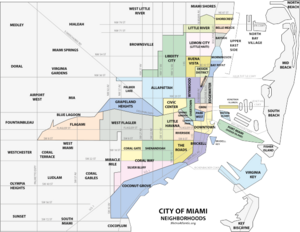Omni (Miami)
| Omni | |
|---|---|
| Neighborhood of Miami | |

Omni viewed at night in May 2011 from Watson Island
|
|
| Nickname(s): Media and Entertainment District | |
 Omni neighborhood within the City of Miami |
|
| Coordinates: 25°47′56″N 80°11′22″W / 25.798964°N 80.189552°W | |
| Country | United States |
| State | Florida |
| County | Miami-Dade County |
| City | Miami |
| Government | |
| • City of Miami Commissioner | Marc Sarnoff |
| • Miami-Dade Commissioners | Audrey Edmonson |
| • House of Representatives | Cynthia A. Stafford (D) |
| • State Senate | Gwen Margolis (D) |
| • U.S. House | Ileana Ros-Lehtinen (R) |
| Population (2010) | |
| • Total | 11,033 (Omni population only) 71,000 (Greater Downtown population) |
| • Density | 20,585/sq mi (7,948/km2) |
| Time zone | EST (UTC-05) |
| ZIP Code | 33132 |
| Area code(s) | 305, 786 |
| Website | Miami Downtown Development Authority |
The Omni, or sometimes labeled as the Media and Entertainment District, is a neighborhood of greater Downtown, Miami, Florida, United States, just south of Edgewater. It is bound roughly by North 24th Street to the north, Interstate 395 to the south, by the Florida East Coast Railway and North East 2nd Avenue to the west, and Biscayne Bay to the east.
Omni is an urban, residential neighborhood with many high-rise residential towers, as well as some smaller scale historic buildings. Omni is home to the Adrienne Arsht Center for the Performing Arts, the old Miami Herald headquarters (now located in Doral, Florida), and the Omni International Mall. Until 2014 it was one of the neighborhoods that hosted the annual Miami International Boat Show at the Sea Isle Marina. The City of Miami Cemetery, one of Miami's oldest cemeteries, is also located in Omni, as well as the historic Women's Club, and some of Miami's oldest churches and synagogues.
Omni is served by the Omni Loop branch of the Metromover and by the Metrorail via Metromover at Government Center.
From the 1920s to the 1950s, the Omni area was a high-end shopping area with many major department stores along Biscayne Boulevard, such as Sears, Roebuck and Company (whose tower still stands at the Arsht Center), Jordan Marsh (NE 15th Street and Biscayne Blvd) built in 1956, and a Burdines (NE 14th Street and Biscayne Blvd). By 1930, this area of Biscayne Boulevard was the home of Sears (later Burdines) Store, and the Shrine Building (which still stands at NE 14th Street and Biscayne Blvd), all of which were designed and built by the Biscayne Boulevard Company in the Art Deco architectural style. The area from NE 13th to NE 16th Street was envisioned as a high-end shopping district. By 1930, early tenants in the Shrine Building included the Piggly-Wiggly grocery store, Biscayne-Page Electric Company, and the John Turner Piano Store on the first floor. Other tenants in 1930 were the Home Drug Store and the Burroughs Adding Machine Company.
...
Wikipedia
